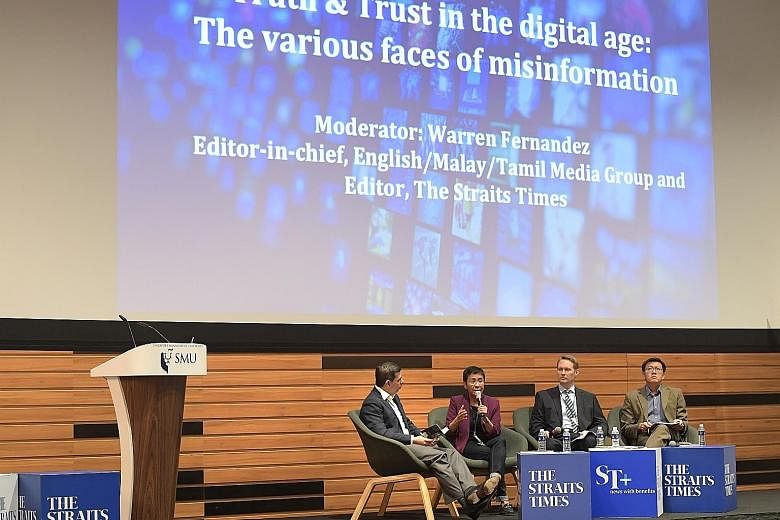On Sept 2 last year, an explosion ripped through a night market in Davao, killing 15 people and wounding 70 more.
Philippine President Rodrigo Duterte declared a nationwide "state of lawlessness" the next day, granting the military additional powers.
At the same time, an article from online news site Rappler, titled "Man with bomb nabbed at Davao checkpoint", was shared by several pro-Duterte Facebook pages, and quickly went viral.
The problem: The story was from March last year.
Its resurrection was a carefully orchestrated exercise in disinformation, said Rappler chief executive officer Maria Ressa, who was in Singapore last week for a forum on fake news.
Duterte supporters had used the story to dupe readers into believing that the President's move had helped to stave off yet another vicious attack.
When Rappler pointed out the article had nothing to do with the September bombing, pro-Duterte netizens and pages launched scathing attacks on the site and its staff in a bid to discredit and frighten them, said Ms Ressa, who herself had to fend off a barrage of death and rape threats.
This episode was among the examples given by speakers at a two-day forum, called Keep it Real: Truth and Trust in the Media, to illustrate how fake news has been used to mislead.
UNDERMINING OF DEMOCRACY
The consequences of fake news are serious, said Home Affairs and Law Minister K. Shanmugam in his opening address to the forum."It undermines the very fundamentals of a democratic society. It undermines the media. It undermines trust in government. It undermines what the truth is. It spreads fear and panic.
"It undermines domestic politics and society as a whole. It de-legitimises leaders. It divides societies. It endangers lives."
Participants at the forum, which was organised by The Straits Times and the World Association of Newspapers and News Publishers and attended by news executives, technology experts and policymakers, were not short of examples of virtual falsehoods and their real-life consequences.
Mr Shanmugam highlighted some of the lies that emerged during the 2016 US presidential election - from Mrs Hillary Clinton selling weapons to terrorist group ISIS and running a paedophile ring out of a pizza restaurant in Washington, to claims that the Pope had endorsed Mr Donald Trump.
The election helped drive home the impact of misinformation, illustrating how it can bring mistrust into the whole process of democracy, he said.
Fake news has been a fixture in elections. French voters had a taste of it ahead of the presidential polls, from claims that Ms Marine Le Pen's father was growing marijuana on his estate to rumours of then-candidate Emmanuel Macron's secret offshore account.
Such falsehoods can upset the very concept of a free and open election. Singapore Management University law don Eugene Tan said: "Fake news strikes at the very heart of representative democracy, the whole idea of an informed electorate engaged in informed deliberations, in a keen contest of ideas."
Besides influencing opinions, misinformation can provoke real-life chaos, and even violence.
Mr Jason Subler, Reuters' managing editor for news strategy and operations, Asia, recalled how worried Chinese shoppers scrambled to buy salt after a health hoax went viral in 2011.
Text messages claimed that the fallout from a nuclear plant in Japan damaged by natural disaster would affect all of Asia, and that salt could stop radiation sickness.
"There was a Reuters photo of people essentially crawling over one another, the people in front wincing out of being squashed, in this mad dash to buy salt," said Mr Subler, who spent more than a decade as a reporter in China.
And in a world growing bitterly divided, fake news has also been used as a tool to stoke hatred by exploiting the prickly faultlines of race, religion and nationality.
For instance, false reports have fanned the flames of xenophobia, said Mr Shanmugam.
And, terrorists, too, are purveyors of online falsehoods, he added, pointing out how they use misinformation as a means to spread hate.
A VICIOUS CIRCLE
Mr Mahfuz Anam, editor of Bangladeshi paper The Daily Star, said lapses in the media have buoyed the rise of fake news.
"We've lost very vital links with our readers," he said. "We've pandered too much to the advertisers, became too close to the government in many instances, and the public started feeling we were not really upholding their interest."
Meanwhile, Mr Subler pointed to how the clampdown on the free press in China has created an atmosphere of distrust in the government and institutions like the press.
"People don't really believe what they're reading in the mainstream media, so they're even more prone to want to believe other things that people are spreading," he said.
And it is a vicious circle: Fake news has helped further chip away at this trust by attacking the credibility of traditional sources of information.
Ms Ressa pointed out that perpetrators seek to "cripple journalists" by branding the content they produce as biased or as outright lies.
Never has this been clearer that in the era of the Trump administration, putting out "alternative facts" of its own even as it decries media outlets it has clashed with.
Creating a "strong climate of trust" will be crucial in dampening the impact of fake news, said Mr Shanmugam.
Much is at stake. "If the distrust becomes deep-rooted, people will have serious doubts about institutions, about governance, and you then get a fractured polity," he said.


